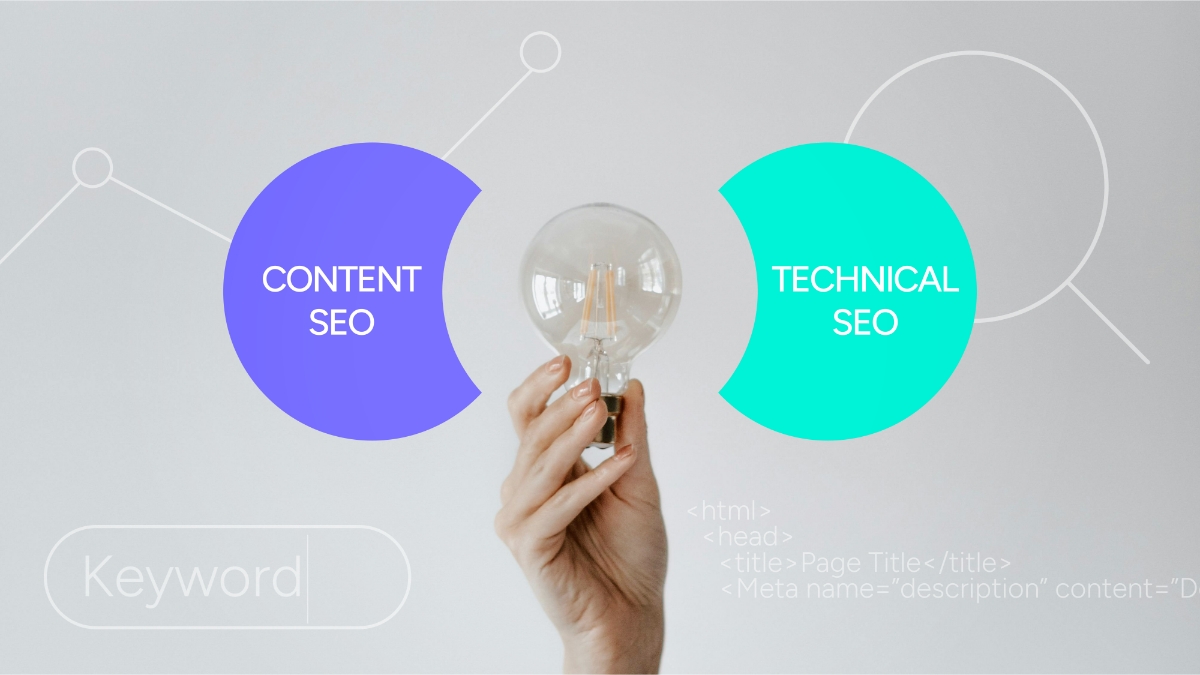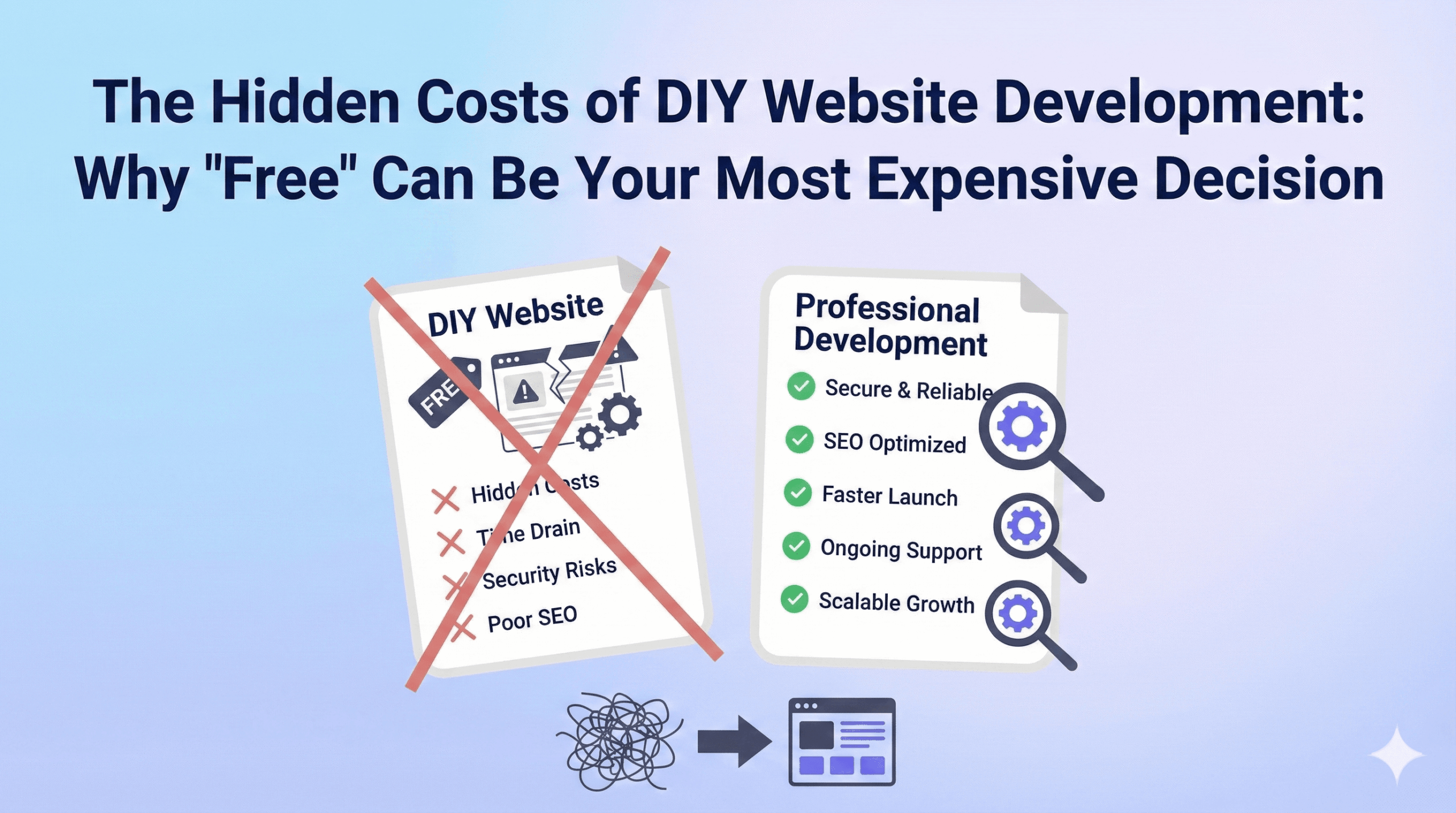Firstly, if you’re not already familiar, SEO, or Search Engine Optimisation, is the practice of driving organic traffic to your website rather than relying on direct visits or ads. SEO is a cost-effective strategy that focuses on gaining traffic through high rankings in search engine results. When search engines list your site as a relevant answer to a user’s query, it’s considered organic traffic. These organic results appear beneath the paid ads, which are displayed as “sponsored.”
This article provides a detailed comparison between Technical SEO and Content SEO by defining what they each are, their key features, and their importance. We will look into the strengths and weaknesses of both approaches to help you decide which strategy might be most effective for your website.
Understanding the differences
Technical SEO and Content SEO have evolved alongside search engines themselves. As search algorithms became more sophisticated, so too did these SEO strategies. Technical SEO emerged as developers recognised the importance of site structure and performance in search rankings. Content SEO, on the other hand, grew from the realisation that high-quality, relevant content is required for attracting and retaining visitors.
Technical SEO is about making your website ‘technically’ sound and accessible to search engines. It involves optimising various technical aspects of your site to ensure that search engines can efficiently crawl, interpret, and index your pages. This includes improving site loading speed, implementing structured data, and ensuring proper site architecture.
Content SEO, on the other hand, focuses on creating and optimising the actual content on your website. This strategy involves researching keywords, creating high-quality content that addresses user intent, and structuring that content in a way that’s both user-friendly and search engine-friendly. Content SEO also includes link-building strategies to increase the site’s authority and credibility.
Key features
Technical SEO:
- Focuses on the back-end structure of a website
- Aims to improve crawlability and indexability
- Emphasises site speed, mobile-friendliness, and security
- Involves implementing structured data and optimising site architecture
Content SEO:
- Concentrates on creating and optimising website content
- Aims to satisfy user intent and provide value
- Emphasises keyword research and implementation
- Involves creating high-quality, engaging content that earns backlinks
Focus Areas
Technical SEO:
Requires technical expertise and often involves working with developers or IT teams including tasks such as:
- Site speed optimisation
- Mobile responsiveness
- URL structure and site architecture
- Structured data implementation
- Fixing broken links
- XML sitemaps and robots.txt files
- HTTPS security
- Meta tags
Content SEO:
Typically handled by content creators, marketers, or dedicated SEO teams involving:
- Keyword research and implementation
- Content creation and optimisation
- Meta tags and descriptions
- Internal linking
- Link building
- User engagement metrics
Why is Technical SEO Important?
While technical SEO elements like a robots.txt file may not directly influence rankings, they are important for your site’s overall performance. These factors alone might not boost your SERPs (Search engine results pages), but without them search engines can’t crawl and index your pages effectively, meaning your web pages are unlikely to feature anywhere beneficial on search engines like Google.
Technical SEO helps make your website easy to navigate and free of any technical issues that prevent it from being understood and ranked. Optimising aspects like site speed and mobile friendliness are key to improving Google search rankings.
Why is Content SEO Important?
Content SEO (as the name suggests) focuses on creating and optimising the content that appears on your website. It begins with keyword research to identify terms users are searching for, and incorporates these keywords into titles, headings, and body text. Content SEO aims to make the content more relevant to search queries. However, keyword optimisation is just one aspect.
Content SEO also encompasses link-building strategies to increase the site’s authority and credibility. Since search engines evaluate your content against so many other pages, creating valuable, authoritative content and acquiring backlinks from credible sites will help improve your rankings.
Structuring content for readability—using formatting techniques like bullet points and subheadings—and internal linking are also key aspects that enhance user experience and help with discoverability.
Pros and Cons
Technical SEO
Pros:
- Improves site performance and user experience
- Enhances search engine crawling and indexing
- Provides a strong foundation for overall SEO efforts
- Can lead to immediate improvements in site visibility
Cons:
- Often requires technical expertise such as a web developer or SEO strategist
- Benefits may not be immediately visible to users
- Regular reviews and updates are needed to keep up with evolving standards
Content SEO
Pros:
- Directly addresses user needs and intent
- Builds brand authority and credibility
- Can drive long-term organic traffic growth
- Supports other marketing efforts (social media, email marketing)
Cons:
- Often requires a writer, SEO strategist, content creator or campaign manager
- Results can take time to manifest
- Requires consistent content creation and optimisation
- Success depends on content quality and relevance
- Can be challenging to scale while maintaining quality
Final Thoughts
Both Technical and Content SEO approaches are important for a comprehensive SEO strategy. For businesses looking to improve their search engine rankings, our recommendation is to start with a solid technical foundation to ensure your website is fast, secure, and easily crawlable. Then, focus on creating high-quality, relevant content that addresses your target audience’s needs and interests. Finally, as with many things, a “set and forget” approach won’t yield long-term benefits. We recommend auditing both your technical setup and your content strategy regularly to identify areas for improvement.
Do You Have Questions About SEO?
Speak to one of our experienced team members for effective and practical advice and if a Technical SEO Audit can help you.







